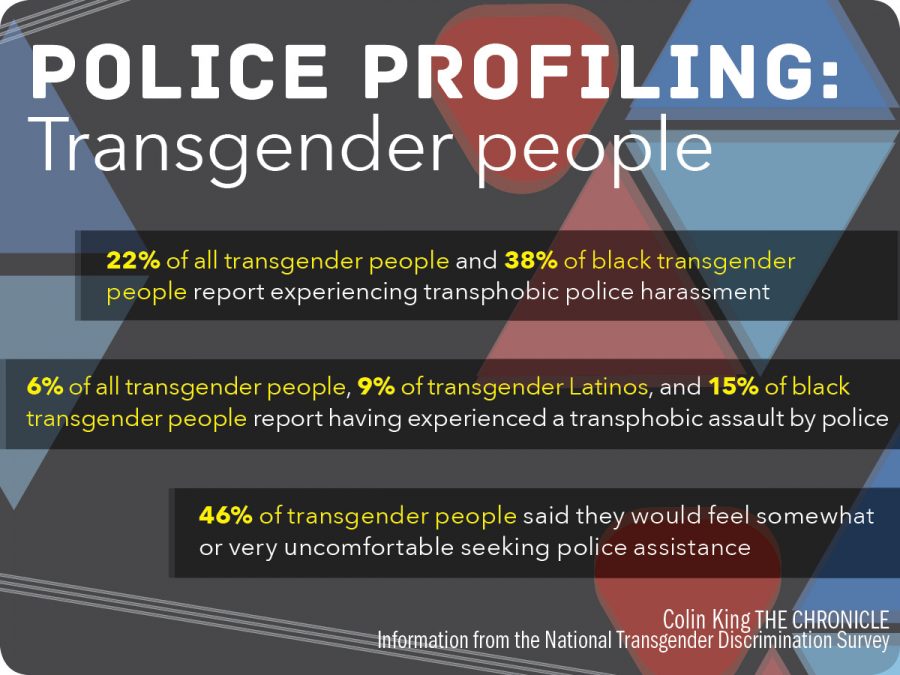City Council approves new police profiling ordinance
Police Profiling: Transgender People
January 26, 2015
The Chicago City Council voted Jan. 21 to expand Chicago’s preexisting ban on police profiling to include “gender identity” and “national origin,” a move aimed at protecting the city’s transgender and immigrant communities.
The council’s decision followed the City Council Finance Committee’s unanimous Jan. 15 approval of the ordinance. Alderman Edward M. Burke (14th Ward), chairman of the Finance Committee, said the ban is consistent with Attorney General Eric Holder’s new guidelines for federal law enforcement agents issued by the Department of Justice Dec. 8, 2014. The Federal government has banned profiling based on race or ethnicity since 2003.
Chicago has prohibited police profiling based on race, ethnicity, gender, religion, disability, sexual orientation, marital status, parental status, military discharge status, financial status or lawful source of income since 2001. The updated policies are simply expanding the definition of police profiling.
The guidelines come at a time when public trust in the criminal justice system is being tested, Burke said. The deaths of unarmed black men Michael Brown, 18, in Ferguson, Missouri, and Eric Garner, 43, in Staten Island, New York, at the hands of police officers sparked protests nationwide.
“[The ordinance] reaffirms the city’s commitment to prohibiting biased-based policing, which is intended to uphold the integrity, legitimacy and efficacy of our law enforcement practices,” Burke said. “Hopefully affirming our commitment to treating all persons with courtesy and dignity will help strengthen Chicago’s trust in our criminal justice system.”
Co-sponsor of the ordinance Alderman Tom Tunney (44th Ward), who represents the historically gay neighborhood Boystown, congratulated the Chicago Police Department’s emphasis on sensitivity training for cadets and current officers. He said the relationship between the CPD and the LGBTQ community has come a long way in recent years.
“This ordinance is a positive step forward in recognizing the community as valuable and the needed protections for this most important community that I serve,” Tunney said.
The Chicago-based LGBTQ advocacy organization Equality Illinois also applauded the policy change.
“Adding gender identity to the anti-profiling law is a major win for the city’s transgender residents,” CEO Bernard Cherkasov said in a Jan. 21 Equality Illinois press release. “The ordinance recognizes the unique situation that transgender people face in achieving full equality, and it enshrines in law that they should be treated fairly and with understanding. We appreciate the action of the City Council in adding ‘gender identity’ and ‘national origin’ and commend the Chicago Police Department for its support.”
Fred Tsao, senior policy counsel at the Illinois Coalition for Immigrant and Refugee Rights, said Chicago has been a historically welcoming city to immigrants, and the new policy is in line with ensuring that immigrants are “respected as full members” of American society.
Tsao added that some immigrants who move to the U.S. have a fear of law enforcement, which may have been more oppressive in their native countries.
“This is a welcome step on the part of the Finance Committee [and City Council],” Tsao said. “I think any gestures, any policies, any initiatives on the part of the city to reach out to these communities are definitely welcome. The reciprocation is certainly useful as well—communities reaching out to police authorities and again making sure that interactions are handled well and respectfully.”
Despite a ban on police profiling, data shows that it still occurs.
The American Civil Liberties Union of Illinois released two reports last year that found evidence of police profiling in traffic stop data collected by the Illinois Department of Transportation.
A report released in December found that of the 100,676 traffic stops made by Chicago police in 2013, nearly half of the stops involved black drivers, a far higher number than the percentage of black residents in the city’s population. Black drivers constituted 46 percent of traffic stops by Chicago police in 2013, but only make up 32 percent of the city’s population. Black and Hispanic motorists were also far more likely to be searched by police, according to the report.
The report also found that in the five police districts with higher percentages of white residents, black motorists are over-stopped by ratios ranging from 1.7 to 7.5, while Hispanic drivers are 1.1 to 2.3 times more likely to be stopped than white drivers.
Ed Yohnka, director of Communications and Public Policy at the ACLU of Illinois, said the City Council’s new policy is a positive step, but that it will not curb police profiling without meaningful cultural change within the department.
“The policies are good, and we don’t want to see those go away, but what we want to make sure is that we are constantly looking for ways to improve training, improve oversight, improve tracking to gather more information and more data about these kinds of stops, because the way that we’re really going to root them out is having this data and having behaviors change within police departments, not because of any particular policy,” Yohnka said. “We see fluctuation from year to year, but by and large, the data remains about the same.”








